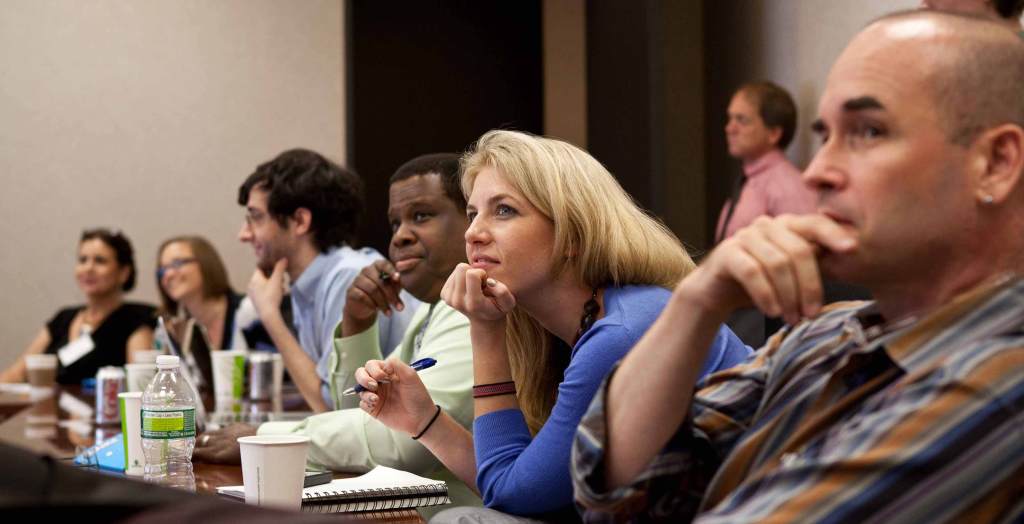 ©Ford Foundation
©Ford FoundationWith the announcement of our new programs, we know many of you have questions. We answer some of them here, and we will continue to respond to questions and feedback over the next several weeks.
Why focus on inequality? Can the foundation really “solve” such a huge problem?
Put simply, we believe that inequality, in all its forms, is the greatest impediment to just, fair, and peaceful societies. It is at the heart of many of the world’s most serious challenges, and its effects run deep. Following an intensive exploration, we identified several common factors that fuel inequality around the world. These are our five drivers, and they are central to our analysis of inequality and our approach to addressing it.
Certainly, inequality is far too big a challenge for any one organization to confront alone. That’s why we work in close partnership with an array of other organizations that are making progress in this and related areas—progress we hope our own efforts will complement and supplement.
The foundation last completed a program strategy overhaul in 2009. Why do you need another one so soon?
When Darren Walker became president in 2013, the foundation as a whole began to review our priorities, the impact of our work, and the way we, as an institution, were positioned to address the key issues of our time. We did so with a mind to strengthening our focus, our funding, and the way we work—to organizing ourselves to do the very best we can with finite resources and to respond strategically to new challenges and opportunities as they emerge.
This evolution in our program deliberately builds on the overhaul of several years ago. We live and work in a world that is in a constant state of change, and as a foundation, we need to be equally dynamic. Our new programs reflect this changing world, our efforts to sustain and strengthen areas of work that are aligned with fighting inequality, and the different ways we need to operate as a result. We have come to realize, for example, that breaking down the silos in our work will help us bring a more (and much-needed) holistic approach to tackling complex problems.
But we can’t emphasize this enough: Though it may not be obvious on the surface, our new framework remains rooted in the principles that have guided the foundation for eight decades. A rights-based approach, partnership with all sectors of society (including government and the private sector), support for the people who live and work closest to the problems we seek to address—these values flow through everything we do.
What informed the decisions you’ve made about what to focus on and how to work?
From the moment we kicked off the process of reimagining our work 18 months ago, we’ve been talking to our colleagues, peers, grantees, and partners, as well as other social justice leaders, about what they think are the most important issues for a social justice philanthropy to tackle today. To take stock of the whole picture of social justice in the world, we explored the global trends that are shaping the quest for human dignity—trends such as climate change, extremism, short-term economic thinking, and the struggle to realize the promise of democracy. We asked questions and listened closely, and asked more questions. We brought to the foundation leading thinkers on issues that are important to our work (from migration to networks to arts and culture) to discuss those issues with us and to help us reflect on how we can best address them. We researched inequality and carried out in-depth analyses of its manifestations in every region where we work.
We also asked for candid feedback about our work so far. We heard, for example, that our efforts have been too diffuse and fragmented. That drove our decision to structure our approaches in a more integrated, interdisciplinary way. We also heard that the organizations on the frontlines of social change today need a different kind of support from what foundations are often willing to commit. That drove our decision to increase our investment in multiyear core support for institutions and build a robust network of organizations addressing inequality around the world.
How were decisions made? Who was involved?
From the beginning, it was important to us that this process be a highly collaborative one. Over the past year, the foundation’s staff from around the world came together to identify opportunities and create a new framework. They shared ideas, navigated disagreements, and made tough choices. While final responsibility for these decisions lies with our president and leadership team, everyone in the foundation played a role in the challenging process of redesigning our program structure and priorities. And we are gratified that our FordForward programming reflects that.
Our grantees were also critical partners in informing our choices. The responses to our surveys, the honest feedback, and the learning that grantees have shared have been key to our process and decision making. As we further develop the strategies for our work going forward, our teams will continue to consult and engage with others as we strive to create smart, effective, multidisciplinary approaches. And as a foundation, we look forward to continued and honest feedback from the organizations with which we have worked, to ensure that we stay true to our mission and goals.
What will you stop funding? How did you decide what areas to discontinue?
As Darren said this summer in his letter about FordForward, we had some difficult decisions to make. But our decision making was grounded in specific criteria: Was this area of work central to challenging inequality? What kind of progress has been made in this area, and how sustainable is it? What other funding sources are available for this work?
Guided by these questions, we decided to discontinue our work in several areas, some of which are deeply rooted in the foundation’s history: microfinance, conditional cash transfers in Latin America, arts spaces in the US, religion in the public sphere, extending the school day, and LGBT issues in the US. The decision to withdraw from these areas wasn’t easy. In some cases it was painful. But we are confident that these were the right decisions to make as we refocus our efforts on fighting the drivers of inequality.
As we’ve done in the past when exiting a field or ending support to a long-term grantee, we will make every effort to do it responsibly. Often, this means tapering off our funding gradually, or helping grantees transition to other available sources of support.
Is this all set in stone? Will there be more areas in the future? Will you ever decide to fund something that lies outside these areas?
As our strategies evolve, we will continue to respond to the needs of a changing world. We are always looking ahead—searching out new ideas and innovations that can advance our mission. We will always remain open to new challenges and opportunities, but the lens of inequality will continue to drive our choices and decisions.
The BUILD investments represent a substantial portion of your annual budget. What does that mean for project support? How much money will you allocate for themes and project support versus your Building Institutions and Networks initiative? Will they overlap at all?
Taking into account the feedback from partners and organizations we support, we have allocated $1 billion to investments in core support over the next five years. But program areas will still command the majority of the foundation’s annual grantmaking budget.
As the strategies are developed for each of the program areas, it is possible that funding to some organizations will be on a project basis. It is also possible that an organization that receives core support through a BUILD investment might be engaged on a project-specific basis as well. Regardless, our goal is to empower organizations to do their best work as we move forward to address the next era of social change.
Do I need to be a big established organization to be funded by BUILD grants?
No. We want to support a full and robust ecosystem of organizations and institutions dedicated to fighting inequality. You can be big, small, new, old, movement based, online, on the ground—or something else entirely.
We will provide more detailed information in the coming months, but it is important to emphasize that we will support a limited number of organizations under this initiative. The initial cohort will likely be selected by invitation only. As BUILD develops over five years, we will increase the number of organizations that receive this kind of support and we will establish open processes—which will allow organizations of all ages and sizes, from everywhere in the world where we work, access to a level playing field.
Will there be changes in your global offices?
The program changes we are making are global, and they affect all our work worldwide. Each of our 11 offices is developing its own strategy for working in the thematic areas, based on local context and priorities.
Responding to local contexts has always been central to our work, and that will continue when all offices move forward with new grantmaking in early 2016. We see the five drivers of inequality as being common around the world, but the best ways to tackle them vary from place to place. We also believe that it’s important to connect the work being done in different local offices, as well as to align the work to global trends that are shaping the world beyond any one country or region. Sometimes global rules and realities are what affect local situations most deeply. As a global organization with local expertise, we’re in a position to understand where the most effective leverage points are.
What happens next? How do I apply for a grant?
In these last weeks of the year, our new program teams are meeting to begin planning for 2016. They are also wrapping up transitional grantmaking for 2015.
During this period, we are not accepting proposals for new funding. (The exception to this is our JustFilms program; you can access that inquiry here.) When the general inquiry process reopens in early 2016, we will announce it on our website. You can also sign up to receive updates via e-mail.
When will grantmaking begin in the new program areas? When will there be more specifics?
New grantmaking will begin in January 2016. As we reach milestones in shaping the new strategies, we will continue to update our partners and grantees.
For now, the website’s descriptions of thematic areas and the work of each regional office are blueprints. Specifics will come into focus as teams start to make grants in early 2016. It’s important to note that our program teams are not all starting in the same place: In Youth Opportunity and Learning, for instance, our new director begins work this month. Inclusive Economies is still recruiting its new director. Other areas have more settled teams and will be further ahead.
I don’t see my question answered here. Will I have a chance to ask more questions?
Absolutely. We welcome your questions and feedback in the comments section below, and there will be other opportunities to engage with us in the coming weeks. We will also continue to provide you with updates as we make further decisions and refine the lines of work.


